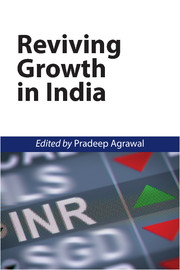Book contents
- Frontmatter
- Contents
- List of Tables and Figures
- Preface
- Section 1 The importance of growth
- Section 2 Reviving growth of industry and exports
- Section 3 The dampeners to growth: Controlling inflation
- Section 4 The supply constraints to growth
- Section 5 Emerging issues in growth: The labour and capital markets
- Chapter 12 Issues in Labour Cost and Employment
- Chapter 13 Financing Structure and Growth: A Study of Firms in the Indian Private Corporate Sector
- Chapter 14 Export Intensity and Dividend Policy of Indian Firms
- Contributors
- Index
Chapter 12 - Issues in Labour Cost and Employment
from Section 5 - Emerging issues in growth: The labour and capital markets
Published online by Cambridge University Press: 18 December 2015
- Frontmatter
- Contents
- List of Tables and Figures
- Preface
- Section 1 The importance of growth
- Section 2 Reviving growth of industry and exports
- Section 3 The dampeners to growth: Controlling inflation
- Section 4 The supply constraints to growth
- Section 5 Emerging issues in growth: The labour and capital markets
- Chapter 12 Issues in Labour Cost and Employment
- Chapter 13 Financing Structure and Growth: A Study of Firms in the Indian Private Corporate Sector
- Chapter 14 Export Intensity and Dividend Policy of Indian Firms
- Contributors
- Index
Summary
INTRODUCTION
In the backdrop of globalization, developing countries are trying desperately to reduce the cost of production in a significant manner so that it can help them achieve an edge over others in terms of competitiveness. Labour costs are usually thought to be highly significant. Hence, constant and continuous efforts to pursue capital intensive methods of production are made to attain significant labour productivity gains and to reduce the labour costs. As labour intensive methods also involve a huge range of uncertainties due to labour unrest, capital intensive technological progress is thought to be an obvious solution. No doubt, productive employment generation is an important challenge for most of the developing countries. Thus, keeping in view several rigidities including unionisation and the lack of flexibility that pose major constraints and hamper the smooth functioning of firms, labour market reforms have been suggested on a large scale in order to improve the competitiveness of the countries. Economic reforms in various spheres have already been introduced to remove bureaucratic and other structural rigidities in the system and enhance economic growth, which in turn is thought to reduce poverty by generating gainful job opportunities. However, in the Indian context of example, the lack of labour market deregulations is viewed to be a major constraint in generating productive employment in the formal manufacturing sector and attaining other desirable goals in terms of attracting FDI and rapid industrialization. This is because globalization and shifts in the production activities are expected to impact the labour market outcomes such as wages, employment and labour productivity. Secondly and most importantly, for other reforms, in the area of trade for example, to be successful, labour market reforms are considered as essential prerequisites. It is generally viewed that the labour markets in developing countries are rigid in terms of work practices, wages, hiring and firing policies, etc, and all these have been attributed to the existing labour laws (Fallon and Lucas, 1991).
- Type
- Chapter
- Information
- Reviving Growth in India , pp. 303 - 333Publisher: Cambridge University PressPrint publication year: 2015
- 1
- Cited by

